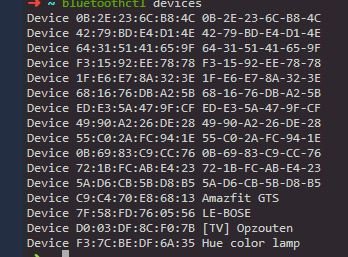Hi,
Using a raspberry pi 3+ with HA OS. I wanted to start using bluetooth as a device tracker, but it seems to fail after some time. To recover I delete the integration, so a new one is made and everythin works for a while (some hours most of the time).
the log show the following:
homeassistant.components.bluetooth.scanner.ScannerStartError: hci0 (B8:27:EB:D5:72:69): Failed to start Bluetooth: [org.bluez.Error.NotReady] Resource Not Ready
2023-01-05 19:35:53.998 INFO (MainThread) [homeassistant.components.bluetooth.scanner] hci0 (B8:27:EB:D5:72:69): Bluetooth scanner has gone quiet for 90s, restarting
2023-01-05 19:35:59.017 WARNING (MainThread) [bluetooth_auto_recovery.recover] Bluetooth adapter hci0 [B8:27:EB:D5:72:69] could not be reset due to timeout
2023-01-05 19:36:04.044 WARNING (MainThread) [bluetooth_auto_recovery.recover] Bluetooth adapter hci0 [B8:27:EB:D5:72:69] could not be reset due to timeout
2023-01-05 19:36:04.058 ERROR (MainThread) [homeassistant.components.bluetooth.scanner] hci0 (B8:27:EB:D5:72:69): Failed to restart Bluetooth scanner: hci0 (B8:27:EB:D5:72:69): Failed to start Bluetooth: [org.bluez.Error.NotReady] Resource Not Ready
Traceback (most recent call last):
File “/usr/src/homeassistant/homeassistant/components/bluetooth/scanner.py”, line 229, in _async_start
await self.scanner.start() # type: ignore[no-untyped-call]
File “/usr/local/lib/python3.10/site-packages/bleak/init.py”, line 156, in start
await self._backend.start()
File “/usr/local/lib/python3.10/site-packages/bleak/backends/bluezdbus/scanner.py”, line 191, in start
self._stop = await manager.active_scan(
File “/usr/local/lib/python3.10/site-packages/bleak/backends/bluezdbus/manager.py”, line 357, in active_scan
assert_reply(reply)
File “/usr/local/lib/python3.10/site-packages/bleak/backends/bluezdbus/utils.py”, line 20, in assert_reply
raise BleakDBusError(reply.error_name, reply.body)
bleak.exc.BleakDBusError: [org.bluez.Error.NotReady] Resource Not Ready
The above exception was the direct cause of the following exception:
Traceback (most recent call last):
File “/usr/src/homeassistant/homeassistant/components/bluetooth/scanner.py”, line 364, in _async_scanner_watchdog
await self._async_start()
File “/usr/src/homeassistant/homeassistant/components/bluetooth/scanner.py”, line 310, in _async_start
raise ScannerStartError(
Not sure what the problem is, hopefully someone here does.
Thanks




